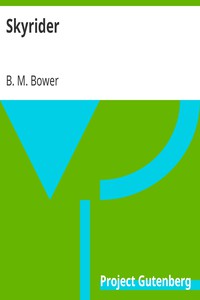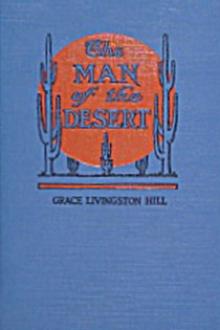The Thunder Bird, B. M. Bower [top 10 most read books in the world txt] 📗

- Author: B. M. Bower
Book online «The Thunder Bird, B. M. Bower [top 10 most read books in the world txt] 📗». Author B. M. Bower
For three quarters of an hour, perhaps longer, Johnny dismissed the thousand-dollar-a-week job from his mind and waited with rising indignation for Bland. What had become of the darned little runt? Here it was nine o'clock, and no sign of him. The lobby was beginning to wear an atmosphere of sedate bustling to and fro. Johnny watched travelers arrive with their luggage, watched other travelers depart. Business men strayed in, seeking acquaintances. The droning chant of pages in tight jackets and little caps perched jauntily askew interested him. Would Bland, when he came, have sense enough to send one around calling out "Mr. Jew-wel—Mr. John-ny Jew-wel"? Johnny knew exactly how it would sound. Cliff Lowell might, but he did not want to see Cliff. The more he thought about him the more he distrusted that proposition. A thousand dollars a week did not sound convincing in the broad light of day. It was altogether too good to be true. Why, good golly! Nobody but a millionaire could afford to pay that much just for riding around; and if they could, they'd buy themselves an airplane. They wouldn't rent one, that was certain.
At ten o'clock Johnny mentally blew up. He had not come to Los Angeles to sit around in any doggone hotel like an old woman waiting for a train, and if Bland or anybody else thought he'd hang around there all day— He went to the desk, left word that he had gone out to Inglewood, watched the clerk scribble the information on a slip of paper and put it in his key box, and went out wondering how he was going to find his way to the Thunder Bird. But his natural initiative came to his aid. He saw an automobile with a FOR HIRE sign on it, held brief conversation with the driver, and was presently leaning back on the cushions watching luckless pedestrians dodge out of the way. The sight, I may add, restored his good humor to the point of forgetting his dignity and crawling over into the front seat where he proceeded to scrape acquaintance with the driver. Los Angeles was a great place, all right—when you can see it from the front seat of an automobile. Johnny began to talk automobiles to the man and managed to extract a good deal of information, that may or may not have been authentic, concerning the various "makes" and their prices and speed. Not that he intended to buy one; but still, with good luck, there was no reason why he should not, when he had that note paid. A car certainly did give class to a man—and according to this fellow it would be a real economy to own one. This man said he looked upon a car as a necessity; and Johnny very quickly adopted his point of view and began to think how extravagant he was not to own one. Why, take this trip, for instance. If he owned the car himself, all it would cost him to go to Inglewood would be the gas he would burn. As it was, it would probably mean ten or fifteen dollars before he was through. An automobile of your own sure did mean a big saving all around—time and money. Take a job like this man Lowell had offered, why, he could very soon own a car. A thousand dollars a week, for a few weeks—it was his to take, if he wanted to do it—
There he went again, playing with the thought until they slid through Inglewood and out on the boulevard that curved flirtatiously close to a railroad track, where he had tramped with Bland—good golly! Was that only last night? Tired and hungry and blue, with a broken plane to think of and Mary V and the Rolling R to forget—last night. And here he was, debating with himself the wisdom of accepting an offer of a thousand dollars a week, thinking seriously of buying himself an automobile! Was it two miles to where they had turned out of the bean field on to the highway? It certainly didn't seem that far today. Except for the curves which he remembered he would have thought the driver had made a mistake when he slowed and swung short into a rough trail that crossed the railroad. But there was the Thunder Bird sitting disconsolately with a broken nose and Lord knew what other disabilities, in the bean field where he had left her. He felt as though he had been away for a month.
With a pencil and paper he was carefully setting down what slight repairs he would need to make, when a big, dark red roadster swung off the boulevard and came chuckling toward them down the rough trail. Cliff Lowell was driving, and he greeted Johnny with a careless assurance of their unity of interest that would make it difficult for Johnny to hold off, if holding off proved to be his ultimate intention.
Cliff climbed out and came up to the Thunder Bird, standing with his feet slightly apart, pulling off his driving gloves that he might light a cigarette.
"They told me at the hotel you were out here, so I came on. Better send that car back to town," he suggested frugally. "I'll take you in. No use wasting money on car hire when you don't have to. I want to talk to you, anyway."
Johnny hesitated, then paid his driver and let him go.
"I've got to go around to a supply house and get me a new propeller," he said afterwards. "And a control wire snapped. We made a bum landing last night—or my mechanic did. He claimed he knew this field, so I let him go ahead."
"Where is he? Did you let him out?"
"I didn't, but I will if he don't show up; pronto." Johnny's tone was the tone of accustomed authority. "He failed to report, this morning."
Cliff reached into an inner pocket and drew out a flat package, which he proceeded to open, using a wing for a table. "I've been busy this morning," he announced, laying his cigarette down on the wing. Johnny promptly swept the cigarette to the ground and crushed it under his heel. Wing coverings are rather inflammable, and he was not taking any chances.
"Pardon the carelessness. I don't know much about airplanes, old man. Well, I went to the boss and had a talk with him, after I left you last night. I put the proposition up to him, and he is rather keen on it. He sees the value of getting news by airplane. The saving of time and the avoidance of publicity will double its value—to say nothing of the chance that we may be able to pick up something of immense importance to the government. Mexican situation, you know—all that sort of thing.
"So he put me in touch with parties that could furnish this." This was a large photographic bird's-eye map of a country which looked very much like Arizona, or the wild places anywhere next the Mexican borderline. "Where I got it I am not at liberty to say. It's a practice map—done for the training in aerial photography that is essential nowadays in warfare. The government is going in rather strong on that sort of thing. This is authentic. Take a good look at it through this glass and tell me what you think of it. Can you see any place that would make a possible secret landing for an airplane, for instance?"
"Golly!" Johnny whispered, as Cliff's meaning flashed clean-cut through the last sentence. He studied the photograph with pursed lips, his left eye squinted that his right eye might peer through a small reading glass. "It would depend on the ground," he answered after a minute. "I'd want to fly over it before I could tell exactly. If it was soft sandy for instance—" (Bland would have snickered at that, knowing what reason Johnny had for realizing the disadvantages of soft sand as a landing place.) "But the topography looks very practicable for the purpose." (Nothing like talking up to your audience. Johnny was proud of that sentence.)
"All right. We'll lay that aside for further investigation. I'm glad you have the plane out here away from every one. We'll take a run over to that locality in my car—it's open season for ducks, and there's that lake you see on the map. A couple of shotguns and our hunting licenses will be all the alibi we'll need. You must know how to get about in the open country, living in Arizona as you have, and I'm counting a good deal on that. That's one reason why I made you the offer, instead of these flyers around here—and by the way, that's one point that made you look like a safe bet to the old man.
"I was talking to him about salary, and he's willing to go stronger than I said, if you make good. He said it would be worth about two hundred a day, which is considerably better than the thousand a week that I named."
Cliff knew when to stop and let the bait dangle. He fussed with a fresh cigarette, paying no apparent attention to Johnny, which gave that young man an idea that he was wholly unobserved while he dizzily made a mental calculation. Fourteen hundred a week—go-od golly! In a month—or would it last for a month?
"How long a job is this?" he demanded so suddenly that the words were out before he knew he was going to ask the question.
"How long? Well—that's hard to say. Until you fail to put me across the line safely, I suppose. There's always something doing or going to be done in Mexico, old man—and it's always worth reporting to the Syndicate. How long will people go on reading their morning paper at breakfast?" He smiled the tolerant, bored smile that Johnny associated with his first sight of Cliff. "I should say the job will last as long as you make good."
"Well, that puts it up to me, then. I'd want an agreement that I'd be paid a week in advance all the time. That's to cover the risk of costly breakage and things like that. At the end of every week I'd be free to quit or go on, and you'd be free to let me out if I didn't suit. With that understanding I'll try her out—for a week, starting to-morrow morning." He added, by way of clinching the matter, "And that goes."
Cliff Lowell blew a thin wreath of smoke and smiled again. "It goes, far as I am concerned. I think the old man will agree to it, providing you take oath you'll keep the whole thing secret. I haven't preached that to you, but the whole scheme blows up the minute it is made public. You understand that, of course, and I'm not afraid of you; but the old man may want some assurance. If he does, you can give it, and if he does not, it will be because he is taking my word that you are all right.
"Now let's get down to business. How long will it take you to get the machine in shape? And can't you make arrangements with the owner of this field to leave it here for the present—and perhaps get him to keep an eye on it? Wait. You leave him to me. I think he's a Jap, and I know Japs pretty well. I'll go hunt him up and talk to him. If we can run it under cover for a couple of days, all the better."
He climbed into his car and went off down the road to where the roofs of





Comments (0)